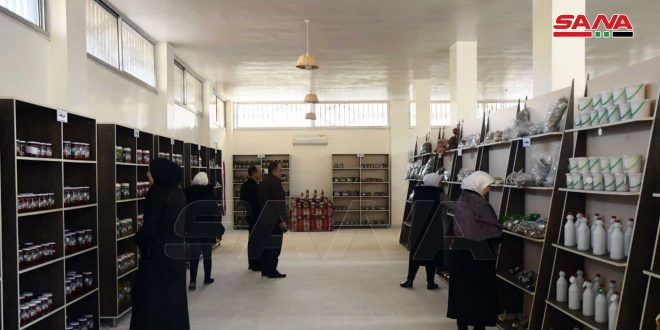In a step to encourage rural women to improve their standard of living and create jobs, the Directorate of Agriculture and Agrarian Reform of Aleppo Province has launched the “Rural Women’s Products Market,” which effectively provides women with the opportunity to market their agricultural and animal products directly to consumers.
The Director of Agriculture and Agrarian Reform, Radwan Harsoni, explained to a SANA reporter that the market has about 27 pavilions displaying rural women’s agricultural and animal products, including honey, jams, tomato molasses, peppers, dried vegetables, wheat products, detergents and some handicrafts that reflect the traditional rural folklore.
Harsoni indicated that the market breaks the commercial mediation cycle between the producer and the consumer through direct sale of rural women’s products to the consumers directly in the city, noting that the products are free of any preservatives or additives and had been analyzed by the Directorate of Internal Trade and Consumer Protection and have the required health specifications. He went on to say that it is one of the 16 provincial-level markets that are linked to supply each province’s products.
He pointed out that the Directorate of Agriculture and Agrarian Reform, through the Department of Agricultural and Family Rural Development, encourages rural families to market their products, stressing that agricultural grants, including irrigation systems, seeds and manufacturing units have been introduced and the market for these products has been established to serve as an integrated cycle for rural development.
Engineer Amani Omari, Head of the Agricultural and Family Rural Development Service, explained that the market aims to support rural women and help them to market their products directly to the consumer. “The Directorate supported the participants in moving their production to the city with a view to encouraging them to produce and to endeavor to deliver their products in accordance with Syrian standards”, she added.
“The participants were trained on the correct production method and the preservation and packaging of the products so that it would maintain its quality for as long as possible without using preservatives and helping to provide the types of wool and textile heritage handicrafts,” Omari concluded.
Talking about her participation in the market, Fatima Al-Saleh indicated that she came from the village of Banan in Jabal al-Hoss in the countryside of Aleppo, and was involved in the production of milk, cheese, dairy, and the manufacture of tomato and pepper molasses, marketing her products in the village, but in primitive and limited ways. However, in cooperation with market management, the necessary facilities have been provided to display and market the products, and to ensure transportation of the products and to dispense with commercial mediation through direct sale to the consumer.
Shams Al-Juma’a clarified that she is involved in vegetable farming, including tomatoes, as she is keen on picking the fruits and washing them well to make tomato molasses. She commended the rural development courses for training women participants in the sterilization, packaging, marketing, and optimization of products, with competitive prices and quality.
Other participants stressed the need to encourage rural women to join courses on agricultural, animal, and manual products and to use them to improve their standard of living.
Amal Farhat

